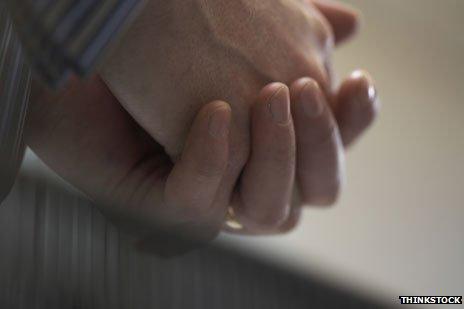Viewpoint: Why I'm right to work with sex offenders
- Published

It's the kind of job that doesn't make for easy small talk at parties. And does working with sex offenders do any good anyway? Here Lydia Guthrie explains why she thinks it's the right thing to do.
My knees were wobbling as I walked down the stairs, wondering how I was going to cope, sitting in a very small room with the man who had done these awful things.
It was my first encounter with a sex offender.
I was horrified by the crimes he had committed against boys, but I pulled myself together and called his name.
An average-looking man stood up. He didn't have horns, he didn't have a tail, he looked like anybody else.
I introduced myself and asked him to tell me what he thought I needed to know about him.
He looked me in the eye and said: "I've done some really dreadful things and the first thing I think about in the morning and the last thing I think about at night is the harm that I have caused and now I'm trying to rebuild my life."
Lydia Guthrie: 'I'm not an apologist for sexual offenders.'
On one level I was struggling with the feelings that any human being would have when meeting somebody who has harmed children and their families.
But on the other hand I met someone who was asking for help.
Should I respond emotionally and treat him with disgust, or as a professional and do what I could to help him rebuild his life?
I chose the latter and worked with him for two years, coming to believe him when he said he never wanted to harm anybody again.
For the past 15 years I have continued to work with men who have committed dreadful crimes. I trained as a social worker and, before becoming a consultant, ran the sex offender treatment programme in the community. I was also a national trainer for the probation service's sex offender treatment programme.
Sometimes people ask, "How can you sit in a room with abusers and not punch them?" Does it mean I actually like them?
I can do it because I recognise the harm done to victims. If there is anything I can do to reduce the risk of it happening again then it's a job worth doing.
The latest figures show that 18.5% of adult sex offenders reoffended in the 12 months to June 2011 - a figure that has been broadly consistent for the past decade.
Rehabilitation works for some sex offenders and good treatment programmes make a significant difference.
As a society we are prepared to accept that people with lots of different problems, like drink and drugs, are capable of reforming. But we are sceptical that people who commit sexual offences can do the same.
Rehabilitation needs to go hand in hand with public protection. The police should use every tool at their disposal - like satellite tracking - to manage the people who pose a high risk.
The length of treatment varies. The highest-risk individuals have up to 200 hours of treatment, usually in two-hour blocks.
During treatment, they must consider how they want their lives to be, what a good life looks like and that there might be a way back into society.
It can be hard to hear. I'm a mum, I've got two children. If somebody committed a sexual offence against them I'd have feelings of rage, anger and hatred. I would want revenge.
But as a society we need to listen to what the evidence shows us about the best way of re-integrating sex offenders.
We live in a society where we don't have the death penalty. Prison sentences mostly have an end - there are only 30 or 40 people in the whole country who have a whole life sentence and will die in prison. The vast majority of sex offenders will be released one day.
We hear about the extreme cases of people who commit offences against many, many children. That forms the basis of the public debate, but these people are the exception.
Sexual abuse has existed in human societies since records began. That's not to downplay it and it has always caused harm, damage and trauma for those involved.
But as a society we need to have more intelligent ways of dealing with it. What we do at the moment is dehumanise the perpetrators, we say they're non-human.
There are something like 40,000 offenders on the sex offenders register at the moment. Are we going to have a great big ship that we put them on that circles the British Isles until the end of time?
Human beings are complex. We're all capable of rage, anger, lust, a desire for revenge. We're all capable of coping badly with problems. I don't think society divides neatly into the kind of people who do awful things and everyone else.
I'm not an apologist for sexual offenders. If you work in this area, you have to make a decision about what you're going to say you do as a job when you go to a party. Some people choose to make something up. I made the choice that I would be open.
I say to them, the human part of me feels pain for the victims, feels anger, sadness and disgust, but the professional part of me recognises that we don't have any magic cure.
There needs to be a group of professionals, in prisons and in the community, who are prepared to work alongside people convicted of sexual offences, to treat them as human beings who have strengths and weaknesses and character flaws like all human beings.
The only difference is that they've done something really awful.
Lydia Guthrie was interviewed by Jennifer Tracey for BBC R4's iPM programme
You can follow the Magazine on Twitter, external and on Facebook, external